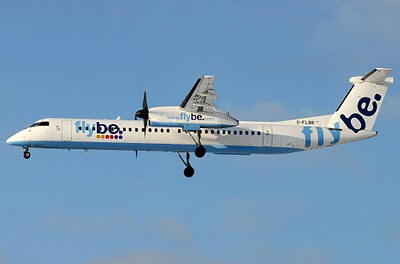
| NEWSROOM |
|
|
 |
|
|
|
|
|
|||
|
By Mike Mitchell |
||||
 |
February 11, 2010 - When a globally successful business can trace its roots back to having started out by simply fulfilling the need for lifeline travel to and from a European island community, it’s no surprise that it continues to listen and respond to the ongoing travel challenges of those same islanders.
This is why, when
a Europe Regional Airline, Flybe was approached last year by one of its
regular customers from the Channel Islands to consider reviewing the
general airline policy that restrict women in late pregnancy from
flying, it wasted no time in getting down to business. The conundrum was this - women who are more than 34 weeks pregnant throughout in the world are not permitted to fly even if they have a valid medical certificate stating they are fit to travel. |
|||
|
However, the understandable limitations of some island medical
facilities mean that some mums-to-be, especially those deemed ‘at risk’
often have no option but to travel - or jeopardizes both their own
and/or their baby’s health.
So they were incurring considerable expense, not to mention the
additional stress in being so far away from friends and family at such
an emotionally charged time, by travelling to attend mainland medical
facilities sometimes well before their due date. Living up to its
reputation as the
Now, having fully investigated and unraveled the various policies and
regulations constraining such specific travel and with the full support
and advice of relevant medical opinion, Flybe has come up with a fully
acceptable solution. |
||||
|
The approved Flybe
routes for passengers who are more than 34 weeks pregnant needing to fly
to attend specialist hospital appointments related to their condition
and who hold a signed medical certificate confirming that they are fit
to fly.
Mike Rutter,
Flybe’s Chief Commercial Officer says: “Flybe is always ready to listen
and respond wherever possible to the needs of our passengers. When we
were approached to take a re-look at airline policy to try and resolve
this issue for the island communities we serve, we didn’t hesitate as
the specific nature of our regional business model means that some 80%
of our shorter routes are over water, many of which serve such
transport-restricted island communities.
“Although we had
many, many challenges to overcome, we are delighted that, as a result of
this adjustment to passenger policy, women in the later stages of
pregnancy can now rest easier in the knowledge that at least they can
now continue to fly to and from home for specialist mainland medical
care.”
Consultant and
Honorary Senior Lecturer in Feto-Maternal Medicine at
Flybe operates a
total 106 flights a week between the Channel Islands and Southampton,
166 between London Gatwick and 52 to and from the Isle of Man and |
| ©AvStop
Online Magazine
Contact
Us
Return To News
|
|